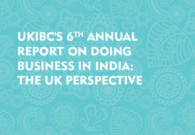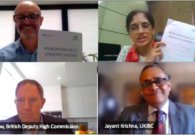Webinar: UK-India Relations Post Brexit
On 2 December, the UK India Business Council (UKIBC), in partnership with the Federation of Indian Chambers of Commerce and Industry (FICCI), hosted a webinar discussing UK-India relations post Brexit.
UKIBC Associate Director Daxa Bharadwa moderated the session led by Dilip Chenoy, Secretary General at FICCI, Richard Cranfield Partner at Allen & Overy and global Chairman of the Corporate group and Co-Head of FIG, and Shanella Rajanayagam, Trade Economist at HSBC.
In his opening remarks, Dilip Chenoy mentioned that the UK and India relationship will have a different dimension going forward. The UK will also have interest in its own interactions. Dilip surveyed the sectors of interest for both the UK and India, which included: agro and agro products; professional and financial services; auto components; IT; metals; government; and media entertainment. He noted there are many positive areas of opportunity, which could dramatically increase bilateral trade and investment.
Richard Cranfield addressed where Brexit currently stands. After reviewing key ‘milestones,’ many of which have in fact been missed, Richard noted that negotiations will continue into next year. Richard discussed political factors from both the EU and UK that could also play into effect on Brexit. A few examples included COVID, foreign policy, Scottish independence, Irish unification, and the recent US election.
Following his evaluation of the new immigration system that will be put in place, Richard examined what the free trade agreement will cover if agreed. One point was made clear: free trade agreement or not, financial services will be materially impacted. This could lead to the possibility for rulings of equivalence, which is granted by the EU and can be taken away, and therefore making it unreliable.
There was speculation on whether Brexit would affect the use of English law, but Richard assured participants that it will remain overall business as usual. As a widely used structure in many contracts, not just in the UK, English law will carry on as one of the two systems of law (the other being US law) used for international trade.
Shanella Rajanayagam assessed four scenarios for UK-EU trade negotiations and added that even if a partial trade deal is agreed, there will still be trade barriers between the UK and EU. She then explained the new UK-EU trade barriers which will weigh on economic growth with the UK Government’s economic modelling. Additionally, the HSBC UK economist expects GDP to be 6% lower by the end of 2022 compared to their pre-pandemic forecast which had predicted a more comprehensive deal with the EU.
Shanella reviewed new deals on the horizon for the UK as well as existing deals that will roll over. The UK can now press ahead with new trade deals, and it is progressing in replicating existing FTAs. Notably, some aspects of these trade deals still require the finalisation of a UK-EU trade deal completed.
Although not a fundamentally new deal, Shanella mentioned the recently signed UK-Japan trade deal, which will ensure continuity of trade preferences. In addition to preserving preferences, the benefit of trade deals is that they provide market diversification opportunities. Currently, the EU still accounts for a large share of UK trade. Shanella also touched on the economic impacts of the UK-US trade deal, which will build on existing trade linkages.
Finally, Shanella concluded her presentation by examining the macro outlook. At the moment, COVID-19 is a more important source of uncertainty than Brexit. Shanella shared insights from the newly released HSBC Navigator survey. Although business optimism has declined quite considerably this year, 68% of UK businesses and 93% of Indian businesses are positive about their international trade prospects for the next 1-2 years.
Many thanks to our exceptional speakers for providing their time and resources for this webinar. If you were unable to join our session on the day, or would like to go through the webcast again, we invite you to watch the webinar below for the discussion in full as well as view some of the resources which have been provided on this topic.

 By Kealan Finnegan
By Kealan Finnegan 





